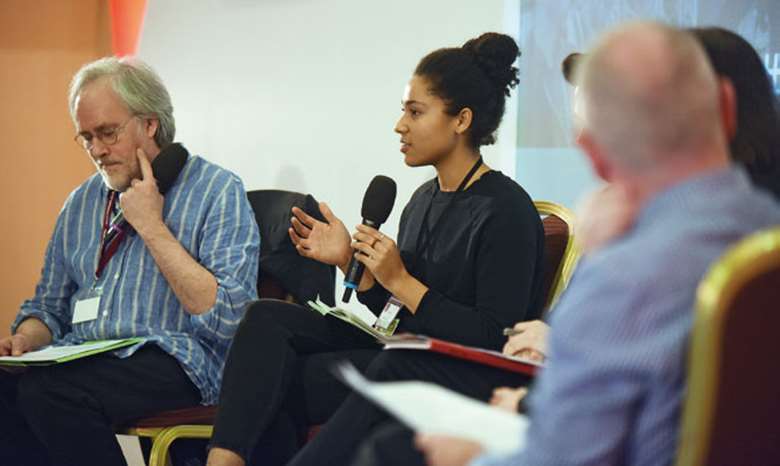Future voices: Music Mark conference
Joe Umpleby
Tuesday, January 1, 2019
It's important that we include young people in the conversation about the future of music education. With that in mind, we asked Joe Umpleby for his thoughts on Music Mark's annual conference.

Marc Kirsten/Music Mark
This was an enthralling introduction into the world of music education, a topic which I never imagined having a vested interest in when I was in education. The conference was themed around youth voice and the challenges facing young people in music today. I would like to take this opportunity to thank Music Mark for giving myself, the Amplify group and CYAC (Croydon Youth Arts Collective) an unforgettable experience presenting at the conference, and to congratulate Bridget Whyte and the rest of the Music Mark team for putting together a fantastic event.
I attended the conference as a delegate as well as an Amplify group member presenting on the opening section ‘Whose Music Education is it?’ which was a collaboration between Amplify and CYAC. Our session focussed on what both groups have achieved so far and plans for the future. This was then followed by table discussions and a Q&A, which was a great way for audience members to get a sense of a young person's opinion on the current state of music education. It was hard to tell from the stage but the feedback we received from the audience afterwards was reassuring, with other speakers quoting our presentation. It truly was a pleasure and a lot of fun.
The first keynote speaker of the conference was Faz Shah, who is an actor, composer, writer and beatboxing violinist. Shah performed marvellously, manoeuvring around the tables while playing his violin, and the audience broke out into a massive round of applause when he arrived on stage. He gave an insight into his own personal experiences growing up around music, and touched on how he feels social media affects young people in a negative way. This felt like a breath of fresh air – it was a thought-provoking way to close the first day of the conference.
The following morning the conference began with our second keynote speaker, YolanDa Brown. YolanDa should be an example to all keynote speakers on how to deliver an engaging speech – I didn't lose concentration for the full time she was on the stage. Purely captivating. The message I took from YolanDa was that music education needs to keep up with what young people enjoy listening to and that this is vital if we want them to engage, a statement I resonate with well from my own experiences with music in schools. This was a very inspiring start to the morning, and props to Music Mark for having two fantastic keynote speakers at the conference.
Following YolanDa we had a presentation from Ally Daubney and Duncan Mackrill from the University of Sussex. This was a fascinating study into the current state of music education in secondary schools. The research focussed on changes made to the curriculum since 2016. The information presented drew a few gasps from the audience and, for me, the most damning piece was learning that a majority of schools are academies who do not have to follow the national curriculum and therefore do not have to offer music as a core subject. I would suggest anybody who hasn't yet seen the research to check it out. The final presentation of the morning was delivered by Susan Aykin of Ofsted. It was uplifting for everybody in the room to hear Ofsted talk about music education. It was particularly reassuring for Susan to highlight some of the key issues that music teachers face and for us to know that it is valued as a subject. The main talking point from this presentation is the new inspection framework for 2019, which was received fairly well and will hopefully bring positive changes.
I decided to dip in and out of the variety of workshops that were available to attend for the rest of the conference. The first workshop I attended was ‘Both Sides Now: Minding the Gender Gap’ which was a collaboration between Brighter Sound and Charanga. This was a very thought-provoking talk about the gender gap in music. On the discussion panel where Anna Meredith and Ruby-Ann Patterson gave interesting insights into their experiences growing up as female musicians. As a male, it was an eye-opening discussion and one that I continued to think about for the rest of the day. The final workshop I attended was ‘Beaming out: one teacher, multiple locations. Is digital learning a WCET solution?’ This was good introduction into how modern technology can be used in music education. In my opinion, this a very important topic, as I think more schools should use technology in all lessons, not just music. The use of technology helps keep young people engaged, especially if they are learning about something that isn't of interest to them. It's good to see that more music hubs are beginning to take this on board.
In conclusion, I heavily enjoyed the Music Mark conference and it was an honour to have been invited along to have the full experience. From speaking with several industry professionals, there still seems to be a gap between generations and cultures. For music hubs and organisations to remain relevant they must continue to evolve with modern culture and not fall behind, a message which I hope people took on board.

